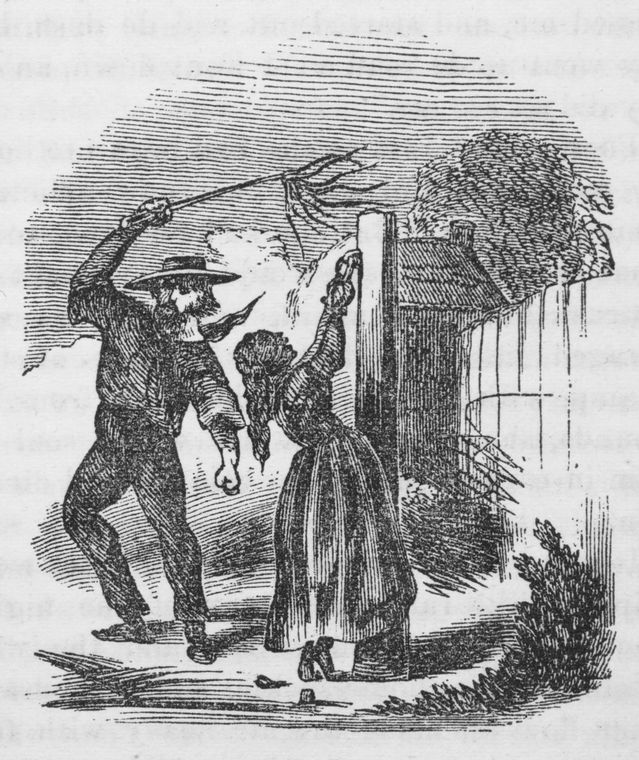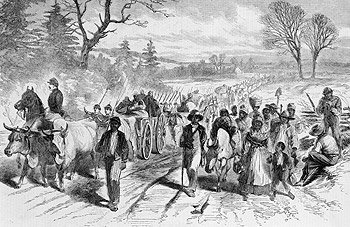
As reported in the New York Times, "Slave Policies," by Virginia Groark, on 5 May 2002 -- IN 1856, just five years before the outbreak of the Civil War, the Charter Oak Life Insurance Company printed a pamphlet offering slave owners in six Southern states the option of insuring the lives of their slaves.
For just $2, Kentucky, Missouri and Tennessee residents, for example, could purchase a 12-month policy from the Hartford-based insurer on a 10-year-old domestic servant that would yield $100 if the slave died. Policies for older slaves, like a 45-year-old, were more expensive, costing the slave owner $5.50 a year.
Though the company no longer exists, these policies are drawing increasing attention nearly 150 years later because of a lawsuit that was filed in United States District Court in Brooklyn, in late March against Aetna Inc. and two other companies, claiming that they profited from the slave trade.
In Connecticut, where insurance has long been a principal industry, the documents exhibit a painful reminder of the past, especially in a Northern state that is proud of its abolitionist ancestors like John Brown.

''It's not pleasant to talk about it today, to put it mildly, but slaves were insured just like any other thing that the farmers owned, that the slave owners owned,'' said Tom Baker, director of the Insurance Law Center at the University of Connecticut School of Law. ''If you were selling insurance in slave states to people who had plantations, that was one of the things that you sold.
''It was very common,'' he added. ''Basically, insurance and slavery go all the way back as far as American history.''
Aetna, which in 2000 apologized for its involvement in slavery, is the only insurance company to be named in the slave reparations lawsuit, though one of the plaintiff's lawyers, Roger S. Wareham, said he expected that other insurance companies would be sued.
A brief examination of documents demonstrates that Aetna was hardly the only company that engaged in the practice.

''It wasn't just the Aetna company,'' said Charles L. Blockson, curator of the Charles L. Blockson Afro-American Collection at Temple University. ''A lot of the old insurance companies, especially the ones that handled shipping in the Newport, R.I., area and New London.''
The problem for the plaintiffs, experts said, is that many firms are defunct, have changed names, destroyed old records, or have been absorbed by other companies. In addition, it is sometimes difficult to document ties to the slave trade.
In the case of slave ships, for example, 19th-century marine insurance policies often didn't identify the cargo on board. Instead, the policy simply stated that it insured ''goods'' on board.
''What strikes me from what I know already is that the records do not say clearly that slaves were insured,'' said Ugo Nwokeji, assistant professor of history at UConn. ''We cannot say that we know it was widespread, although it is well possible that it would have been widespread.''

The insurance industry's connection to slavery is not a new revelation. It has been written about in publications like Mr. Blockson's 1977 book, ''Black Genealogy.'' Even on eBay, the Internet auction site, copies of slave life insurance polices are for sale. And the tale of the slave ship Zong, in which 133 sick slaves were thrown overboard in 1781 so the ship's owners could collect insurance, has been studied for years.
The connection has gained greater attention in recent years because of the research of Deadria Farmer-Paellmann, the lead plaintiff in the federal lawsuit that was filed on March 26 against Aetna, the FleetBoston Financial Corporation and the CSX Corporation. Ms. Farmer-Paellmann first stumbled across slave insurance policies in 1997 while researching a slave reparations paper for a law school class. After reviewing different courses of action, she decided to focus on corporations and private estates that had been involved in slavery.
''And that's how I came into Aetna,'' she said.
Ms. Farmer-Paellmann, who said she is a descendant of slaves, continued to pursue the issue long after her class ended. In 2000, she called Aetna and requested that they send her copies of their policies. She said she received two.


''I was really moved when I saw the policies,'' she said. ''It's one thing to read about it and it's another thing to actually see a copy of the policy, and it really caused me to pause. I have to say it was a very emotional experience.''
So, she decided, it would be appropriate if Aetna apologized and paid retributions.
In March 2000, Aetna expressed ''deep regret'' that for a few years after its founding in 1853, Aetna Life Insurance insured the lives of slaves. Calling it a ''sad'' and ''disappointing chapter'' in the company's history, Aetna has said it only issued a ''small number'' of such policies. To date, the company has records of five policies on 16 lives and is aware of two policies that appeared in books, according to a company spokesman, who, because of the pending litigation, referred additional questions to a statement on the company's Web site.
In one policy, a woman named Mary Raby purchased a 12-month policy for $17.25 from Aetna's New Orleans office in October 1853. If the insured slave or slaves died, Ms. Raby would receive $600, according to a copy of the policy that appears in Dee Parmer Woodtor's book ''Finding a Place Called Home: A Guide to African-American Genealogy and Historical Identity'' (Random House, 1999).
To date, eight companies have submitted information, said Nancy Cramer, deputy press secretary for the California Department of Insurance. Five sent policies and the other three sent information on ships they may have insured, she said. The documents were released to the public last Wednesday.
The California law has prompted companies like Ace Ltd., a Bermuda-based insurance company, to search through archives looking for connections to the slave trade. The company hired a law firm to review its archives, including the records of Aetna Fire and Insurance Company and the Insurance Company of North America. Those companies later became part of Cigna's property and casualty holdings that Ace acquired in 1999. Ace did not find any evidence of slave life insurance policies written by Aetna Fire or the Insurance Company of North America, according to Lisa Fleishman-Hicks, a spokeswoman for Ace.
And though the Insurance Company of North America is one of the oldest insurance companies in the country, Ace compared its marine insurance records against those of known slave vessels and did not find that it had written or carried any policies on known slave vessels, Ms. Fleishman-Hicks said.
For companies that engaged in the practice, it was not necessarily a profitable business. In fact, the Hartford Life Insurance Company went out of business, in part, because of its practice of insuring slaves, according to P. Henry Woodward's 1897 book, ''Insurance in Connecticut.'' The business, which is not related to the current company of the same name, ''tried the experiment'' with insuring slaves ''by shiploads,'' according to the book.
''Although premiums were very high, they were still far from remunerative,'' he wrote. ''As a rule, the worst masters took out policies. Negroes were described as Caesar or Cato, Jim or Tom, and identification was so difficult that if any of a gang died, names in the proofs of loss were easily fitted to them.''
In addition, he wrote, the shippers knew the average percentage of loss ''and hence had every advantage in arranging terms.''
And even though Charter Oak Life Insurance offered policies on slaves, it was not necessarily a business it wanted to encourage, according to the 1856 pamphlet.
''The company is by no means solicitous of securing a large Negro insurance business unless the owners are careful and judicial men,'' Matthew Magill, a Kentucky-based general agent for Charter Oak Life Insurance, wrote in the 1856 pamphlet.
With documents showing that other companies engaged in the practice, is it right that Aetna, which said it has spent $36.5 million in the past 20 years on health initiatives and scholarships, among other things, for African-Americans , bear the burden of the insurance industry's involvement in the slave trade?

Mr. Baker of UConn, for one, doesn't think so.
''I just have a sense that it's unfair that a few companies have been singled out when the slave economy was something that the whole society bears some responsibility for,'' Mr. Baker said.
''My concern,'' he added, ''is more that to the extent that there is some moral responsibility, it should not be targeted to just a few people.''
Ms. Farmer-Paellmann said companies like Aetna are being held accountable for their past practices. Other businesses, she said, will be singled out in the future.
''This is, like I said, the first step,'' Ms. Farmer-Paellmann said. ''They have played a role and they should be held responsible, and later on down the road there will be more companies.'' (source: The New York Times)


You've made some decent points there. I looked on the web to learn more about the issue and found most people will go along with your views on this website.
ReplyDeletemy homepage ... NFL Jerseys Cheap
I cannot thank Mr Pedro loan service enough and letting people know how grateful I am for all the assistance that you and your team staff have provided and I look forward to recommending friends and family should they need financial advice or assistance @ 2% Rate for Business Loan .Via Contact: pedroloanss@gmail.com .
ReplyDelete